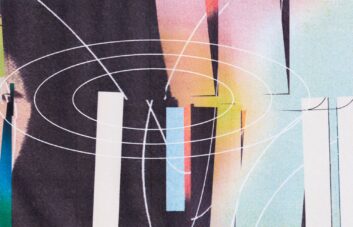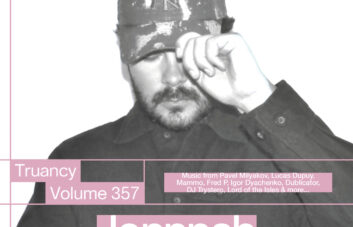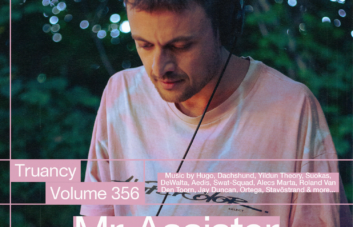Every so often we find ourselves lost in a collection of tracks that melts our surroundings away, pulling us straight back to our favourite memories from the dance floor, whilst wrapped up in beautiful blanket of nostalgia. Enter Edmondson, a producer an DJ hailing from up north in Newcastle, whose delicate and curious perspective on modern minimal, garage, and ambient has really caught our ears the last few years. We first discovered his music through his stunning garage-infused Y2K (Glow Mix) track from his 2022 New Forest Mysticism EP, yet he’s been producing, collecting records and DJing since 2006, releasing on the likes of Hypercolour, Faux Poly, his own label Lissoms and more recently All My Thoughts with his Vanarama Bar EP. Showcasing his ability in blending a sense of place with a touch of escapism, the EP reflected heavily on the duality of his Northern roots and the disenfranchisement and disconnect between Newcastle and the more celebrated cultural music hubs. It’s a beautifully sincere and touching record with a wonderful narrative that has soundtracked many contemplative walks for us. Telling us his formative years were full of Boards of Canada, Animal Collective, Commix, Calibre and Marcus Intalex, it’s easy to see why his productions have that emotive touch to them. We caught up with Edmondson to talk about 2004-2009 era liquid drum and bass, the enchantment of a thriving Leeds house party scene, growing up playing football in the nearby town of Cramlington and his opinions on the musical disconnect he sometimes feels from living up North. His Truancy Volume, an all vinyl mix that focuses on deep, rolling minimal club atmospherics to slowly fill up a little dark club is one for the books.
Hey! Thanks for answering some questions for us! So usually I’ll start with asking how have you been but I was really sorry to hear that your dog suddenly passed away. Any fondest memories you’d like to share with us? “Hey Riccardo! Thanks so much. We got Juno in Berlin a few months before the pandemic started. I’ve worked from home since then, so the last couple of weeks have been rough as it was all very sudden and he was so ingrained into my daily life. He lived in 3 different countries in his short time with us and had a good few adventures – he climbed the snowy Alps, paddled in the Mediterranean, walked on Hadrian’s wall, lost his virginity on a farmyard in Kent. It’s in the everyday things you notice their absence most, so my fondest memories are of him curled into a tight, warm little pretzel alongside me and girlfriend every evening. That and finding my shoes in his bed several times a day.”
So as it’s your first time getting interviewed on the site, I thought we’d go back for a minute. From a mix for Delayed it mentioned that you’ve been collecting music since around 2006. I’ve always said musically that 2006 was such a fun and formative year for me as there was a lot to draw inspiration from. What sort of music were you first listening to then? “Oh man, so much. I was in Leeds then and there was a healthy scene for absolutely everything. I did an iPod swap (lol) with my housemate (coincidentally also named Edmondson) and that put me on to things like Boards of Canada, Jaga Jazzist, Animal Collective, loads of esoteric indie stuff. I lived near Brudenell Social Club so I would go watch a lot of experimental electronica and mathy rock bands there, and regularly go to the West Indian Centre for SubDub/Exodus. That’s where I first stumbled upon early dubstep, dnb and soundsystem music in general. I discovered a night called Momentum at Wire some time round then, which was instrumental for me. I got a pair of decks with my first week’s pay working on a building site in summer 2006 and that was it – I just became obsessed with buying records.”
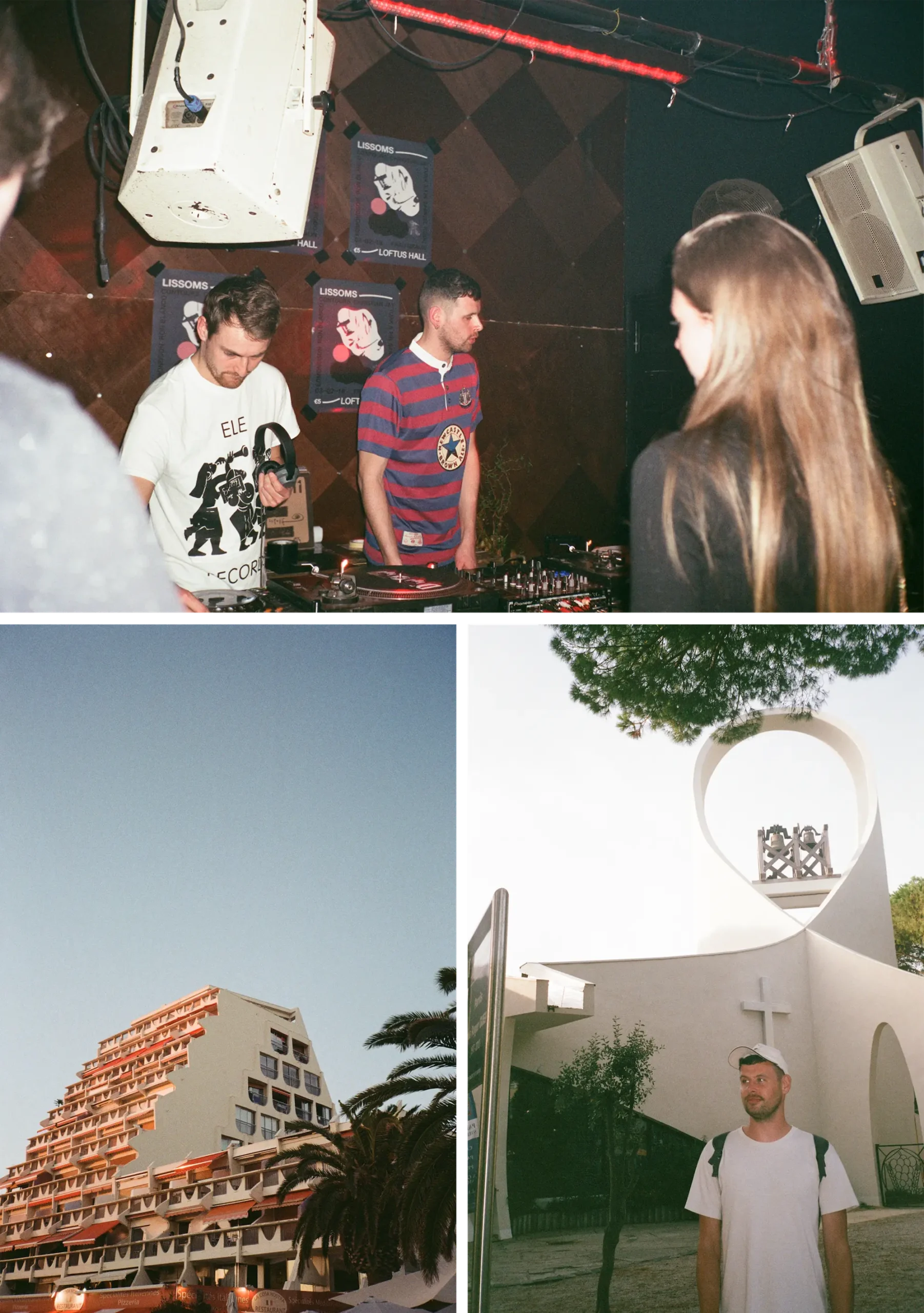
Was drum and bass a big influence for you in this period as much as it was for me? Couldn’t help but notice your drum and bass Bside Incoming mix had a lot of personal faves. Do you think this liquid brand of drum and bass influence has stayed with you throughout your career despite not making? “Absolutely, I loved making that mix as well! I don’t think I’ve ever been as inspired or as honed in on a particular sound as I was then. I think that particular strand of deep/liquid dnb from 2004-2009 or so is often overlooked from a critical perspective – it was mostly overshadowed by dubstep emerging and was left a bit tarnished by the cheesy crossover stuff happening at the same time. My fundamental approach to dance music was shaped by artists like Calibre, Marcus Intalex, Commix, dBridge, Sabre, Survival, Alix Perez and Instra:mental. How they were able to creatively merge elements of so many genres into something super atmospheric and emotive that also communicates well in a club setting, while often being quite understated. Like some of Calibre’s best ones are just a break, bassline and a filtered sample with a couple of little melodic adornments around it, and they’re absolutely killer. There was just a really consistent and focused stream of that kind of music and the scene was healthy enough that you could catch great artists playing in small clubs often.”
Did you get the DJ bug straight away or did it take a couple years? Was there a first dance music record or experience that really stuck with you that you feel kind of set things in motion for you as a DJ? “Less than a year I think, from my first experience of a big drum & bass night at the West Indian Centre to getting decks. The house party scene in Leeds was huge then too, so I’d end up watching DJs of all genres playing records in sweaty basements most weekends. I was pretty enchanted by it all. I remember the second record I picked up was Mist:i:cal – Memory Jog (in HMV!), and that really felt like a moment of discovery – I didn’t know that kind of depth and expression existed in dance music and it was exactly what I was looking for at the time.”
So you’re from Newcastle originally. I’m really trying to think back but I don’t think we’ve had anyone on series from Newcastle before. Can you tell us a little bit about growing up there? Was music your main form of escapism or were there other hobbies? “So I’m originally from a town to the north of Newcastle called Cramlington, which is a mining town turned sixties new town development. Just large housing estates, pubs and football pitches basically. The comedian Ross Noble comes from from there too and he summed it up pretty nicely – “all you need to know about Cramlington is that it’s got a paracetamol factory at one end and a razor blade factory at the other.” I grew up playing football from the age of about 4 as my Dad was a coach, and spent most of my youth trying to quietly blend in with that world.
My parents split and we moved in with my Mam, she shared her love of alternative music with us which essentially sparked my interest in it. From about the age of 12 I would just spend days and nights blissfully watching m2/mtv2, discovering entire new worlds of music. When I was about 15 me and my brother convinced my Mam to let us squeeze a drum kit in between our beds so that I could jam with him on his guitar. We had a nice little local community of skaters and general alternative types, taking the bus into Newcastle for gigs and pulling buckets in the woods. It was a fun little era, if a little dodgy at times, but there’s worse places to be a kid in the North East.”
Can you tell us about the first year when you started learning how to produce and what the influences might have been? Did you grab the hang of it pretty quickly? “It was a year or two after I started DJing. I fell into it pretty obsessively as well, flitting between making liquid dnb rip-offs and kind of early Brainfeeder type beat sketches on Reason 4. I picked it up pretty quickly as it was all I wanted to do for the first few weeks, lots of naive exploration and trying to decipher how to do lots of the little things. The technical side was a bit of a drag for me so it took a few years to get things up to scratch before getting something signed.”

What are some of the greatest lessons you’ve learned through producing and what advice might you give to someone just starting out? “I think you find a lot of cliches when it comes to music production talk but there’s some value in pretty much all of them. You learn a lot about yourself when you’re producing, so my approach has always been to try and make something unique and idiosyncratic, even within pretty fixed parameters like a 6 minute house track. Like if you didn’t make it, it wouldn’t exist – nobody else would’ve done things the way you did, however subtle, and flaws and quirks should sometimes be embraced. It’s very easy to make serviceable club music now and the sonic landscape is saturated with bangers-for-bookings, but you don’t have to rewrite the rule book or invent a new sub-genre to make a valuable contribution. Dance music needs more heart and personality, people listen closer than you think. I feel like sincerity and emotion will always resonate regardless of what’s cool at the minute.
Also, don’t be precious. Yes, covet your good ideas when they happen and pursue the ones you’re excited about, but don’t get stuck in loop paralysis. I’ve wasted literal weeks of my life slowly chiselling the soul out of ideas. If something’s not clicking and you don’t know why, trust your intuition, save a backup, strip the best bits out and do another take. Some of my best tunes have come from those decisions, and others have spawned 3 or 4 new tracks from the original idea.”
What sort of nights were you going to whilst this was all happening? Any stand out events, parties, DJs or crews that you were particularly fond of or attended regularly? “Momentum at Wire for sure. Ant TC1 and 3rd Generation Digital were residents and used to play exactly what I was into on a lovely warm system. Of all the club closures in recent years, Wire hit me the hardest. The Hessle guys were in Leeds at the same time and I caught them at various parties when the more interesting dubstep strands were heating up. I lived in Manchester for a bit afterwards, Mind On Fire collective were doing nice things on the esoteric beats side and a young Chunky used to drop into ours on his way into the city. I used to catch Indigo and Synkro playing out a lot too. It was an exciting time musically.”
What sorts of themes have you explored in your productions over the years? Do you prefer to hone in on a specific concept or direction for each project, or is that something that reveals itself through the process of creation? “I think the Edmondson stuff has always come together very naturally. I usually only finish the projects which really strike a chord with me emotionally and then the best ones I have to hand at a given time are bundled onto a record together. I’ve noticed there’s an aesthetic and a feeling which I’m usually subconsciously looking for, and there’s often a lot of escapism or a sense of dreaminess in the ones which I end up finishing. I’m starting a new project in the new year which will have a more focused approach. I’m excited to try something different, it’s a bit more heavy and dark than the stuff I’ve released before and will be more consciously curated.”
Can you talk about your approach to DJing versus producing? Do you see them mainly as connected. What do you want to get out of every DJ set you play, and what do you want the crowd to leave the club with every set you play? “I think sincerity is the common factor between the two. I’ve gone back to playing a lot more vinyl as I feel like your record collection is usually a more accurate representation of who you are if you’ve been collecting for a while. I found with digital stuff it’s easy to just grab things you’re only half interested in for an upcoming gig or whatever, and you end up with a USB full of things which you’re just partially interested in or familiar with. When I’m DJing I always try to get those deep, dreamy moments in with the more physical club stuff where I can, as those are the memorable bits I’m usually hoping for when I watch someone play.”
We absolutely fell in love with your Vanarama Bar EP for All My Thoughts, especially the title track which I’ve played in a couple mixes already, there’s just a delicate and sincere emotion to it. Can you tell us a little bit about how it came together, state of mind you maybe were in whilst making it and how it maybe fits in your discography. Was there anything you learnt whilst making it? “That’s lovely to hear! Like I mentioned earlier I think this was just a collection of some nice unfinished ones I had sat around when the label got in touch. They end up as snapshots of eras of your life more than anything. Vanarama Bar was originally started when I was still in Berlin before covid I think, and Willows was another rough sketch which I revived for the record. Remind Me in an Hour has a recording of my mate Hacka from school telling the end of a funny anecdote outside Shankhouse club, which I think might be the most geordie dialogue ever committed to vinyl.
I wrote Mercury String last when the record was already underway, and listening back I realise I probably wasn’t having the best time while living back in Lewisham. The melancholy harp element was added pretty late but it resonated with me to the point that I rewrote the track around it. I learned, or was again reminded, not to write off older projects. Vanarama Bar itself was about 4/5 years old by the time the record came out.”

You mention in the release description that on a slightly deeper level the EP speaks to a feeling of distance & disenfranchisement of being up North, and the disconnect between it and the more celebrated cultural hubs. I wonder if you could expand on that for us. You were living in London recently but have now since moved back to Newcastle, are these feelings from the EP still fresh on your mind having moved back up? “Yeah, although I’d say it’s more accurately applied to my feelings and experience in music over the course of the last 15 years rather than recently. Newcastle has a good feeling about it at the moment, things are tough like most places in the UK but it’s a resilient place, and a lot of independent ventures and music scenes are doing pretty well. It feels like the London-centric creative pull has waned a bit after covid, a lot of people like me have been able to relocate back and work remotely up here.
For anyone unfamiliar, Vanarama is the official sponsor of the lower leagues of English football. I like the juxtaposition in Vanarama Bar – the heady glitz of a club in Berlin paired with the grey landscape of a semi-pro football ground in somewhere like Blyth. It resonates with the lingering feeling I have that those kinds of things feel out of reach when you come from somewhere less connected. As a title it’s a bit of a misnomer I guess, as the music itself wasn’t meant to be read in the context of that sentiment – I also just really liked the pun.”
Why do you think there is this musical disconnect from the main cities? I guess it’s hard to not feel somewhat to blame as a site curator when a lot of our past mixes have maybe ignored the north of the UK. “Nah the blame doesn’t lie with independent sites at all, there’s a lot of forces at play and also just not a lot of visibility when it comes to Northern artists. With Newcastle specifically, the wider media will generally only celebrate or platform things which align with a certain pre-existing perception of the region. There’s not a lot of coverage for the more nuanced takes, so it’s difficult to come across the more interesting things which are happening here if you’re not physically in amongst it.
It’s something I’ve thought about a lot, and like everything it’s pretty multi-faceted. There’s a class issue in electronic music which plays out in many forms. I mean, there’s been a class issue in the arts forever, but it feels like it’s not talked about with application to contemporary electronic music that often. Access to funding, knowledge, advice, studio spaces, industry contacts, positive role models, spare time – they’re all a lot more scarce in more working class environments. The ability to say no to things, to play the long game and develop an artistic identity, is a lot more difficult when you’re skint and just winging it without guidance. It’s also more difficult to feel that these kinds of creative pursuits are valid, or that you’re valid in pursuing them, when you’ve never really been exposed to people who’ve successfully pursued them. You end up moving away and your story becomes a London-based or Berlin-based one. I remember being described as “the South London wunderkid” and I was like, I’m a geordie in my thirties with a bad back.
You know how the classic DJ bio will say they grew up playing cello or were like grade 7 pianists before getting into it? I didn’t know anybody like that growing up. I do know plenty of producers who were way more talented than me who’ve just dropped off somewhere along the way, because the amount of obstacles to overcome to consistently create meaningful music and have it reach a reasonable audience is often too much. Things like this lead to us being a bit more underrepresented as a region in terms of creative output.”
Do you think enriching smaller clubs and communities up North could possibly be the way forward if DJs lower their fees to come play at clubs like that? I feel like the big cities are battling with the lack of small cap venues right now. “Definitely, it’s the only way for club culture as we’ve known it to survive. Because the small/medium-sized clubs are closing, there’s a huge polarity with a surge in mega festivals and hyper-local scenes at either end and increasingly little in between. The ecosystems which were built around it are feeling outdated now. The standard DJ + hotel + agent fee package just isn’t really sustainable for a lot of independent and grassroots promoters anymore, and they’re the most vital part of a healthy, varied and well-intentioned scene.
Up here, artists like Caribou have played upstairs at a working mens club in North Shields for Man Power’s night in recent times, so I’d like to think we’ll see a shift towards smaller nights in interesting places being more commonplace. Watching DJs in the same purpose-built club spaces can get repetitive and be a harder sell to people who’re already struggling in the current crisis-fest of modern Britain. Dire times can lead to interesting creative reactions.”
Are there any parties, crews or producers in Newcastle we should be looking out for currently? “I’d urge everyone to check out my mate SL Walkinshaw, whose music I opened this mix with. His record Tape/String is made up of little home tape recordings, sellotaped and looped, and is just incredible – one of my all time favourites. He also put me onto Jacklyn recently, who makes wicked percussive techno stuff. She’s already starting to break out onto the international circuit. Another good friend of mine to shout out is Janay – we first met when he dunked on me at Leazes Park in 2010 and we reconnected through music years later. He was on the Rhythm Section mentorship scheme last year and his productions are progressing fast, making sincere & deep electronic stuff for the right reasons.
You’ve got the beloved community radio station Slacks, which is housed inside The Lubber Fiend – an excellent mixed purpose venue in a former abattoir on the western edge of the city. Public House HiFi too, which is a custom built sound system and party recently started up by locals Diz & Vins. It’s in the same musical ballpark as the likes of Cosmic Slop, which is very exciting. Shout out Tony who runs 586 Records as well, he’s got a great online archive of mixes going back a few decades. I particularly like the ones from when he used to run nights like Reverb and Suono in the 00’s, they give a nice snapshot of the club landscape in the city when I was too young to experience it.”
If you had one day to take a fellow artist on an adventure around your city, where would you go and why? Are there any specific cities you’ve always admired or wanted to experience? “Well! First I’d take them up to Linhope Spout for a swim in an ancient waterfall up in the hills, or to any one of the beaches between Tynemouth and Lindisfarne. We’ve got lush countryside up here. What’s great about the city itself is that you can walk everywhere and it changes rapidly, the mish-mash of ornate & brutalist architectural styles is super interesting and there’s a hundred good pubs and food spots to stop off at along the way. I worked at the Free Trade Inn for years and that’s an essential part of the tour.
There’s too many cities to mention but I’d love to visit Japan in general. I’ve sold a few Lissoms records directly to people over there and they just seem to have a very warm and considered approach to music. I played in Cape Town before the pandemic and I’m aching to get back over there too. The local community, their attitude towards electronic music and the city itself were all amazing to experience. Especially when you’ve come from Berlin in mid-January.”
How does music fit into your daily routine? Do you regularly listen to music or search for new records? How do you focus your intentions and craft, and how distinct are your roles as a producer, DJ, label owner and music enthusiast? “On a good day when I’m nicely focused, I’m listening to records when working the day job at my desk and floating around on Bandcamp or Discogs during downtime. Others I’d just be listening to a few streaming playlists I’ve made over the last few years or letting the shuffle algorithm take over. In terms of roles, they’re all just blurred into one really. I have a nice little studio set up at home so there’s not that much context switching as I can just flick between tasks. I do miss having a dedicated studio outside though, that mental separation element can be really effective in getting you into a productive mindset and feeling a bit more legitimate in your pursuits.”
Can you tell us about three albums that a) define you getting into electronic music in general, b) maybe a midway album when you were fully invested in DJing and and c) a recent album that you’ve especially enjoyed? And what made these albums so special at the time.
DJ Shadow – Endtroducing – It’s not electronic in the purest sense I guess, but is something that’s stuck with me and is one of the reasons why I still love sampling as a concept. I first heard it when I was about 14 and that late-night, loopy atmosphere struck a chord with me, and set the precedent for my entry point into electronic music later when I found artists who had a similar approach and aesthetic.
Jan Jelinek – Loop-Finding-Jazz-Records – Just a sonically delicious record which led me onto his Gramm and Farben projects, the ~scape records sound, GAS and all of that good stuff. Just the way he processes loops into something so warm and familiar, while also feeling a little alien with a janky funk to it. Sampling as a high art form.
Daniel Aged – You Are Protected By Silent Love – This was my most streamed album last year, partially because I’ve found it impossible to get hold of a 12″. Part of the liner notes describe it as “liquid mercury gospel” which is actually super fitting, despite sounding extremely vague. He’s a supremely talented multi-instrumentalist who has worked with artists like Frank Ocean, FKA Twigs and Yves Tumor. With this record he’s crafted quite a unique sound which is an increasingly rare thing, draping vaporous pedal steel guitar Americana across ambient electronic scapes.
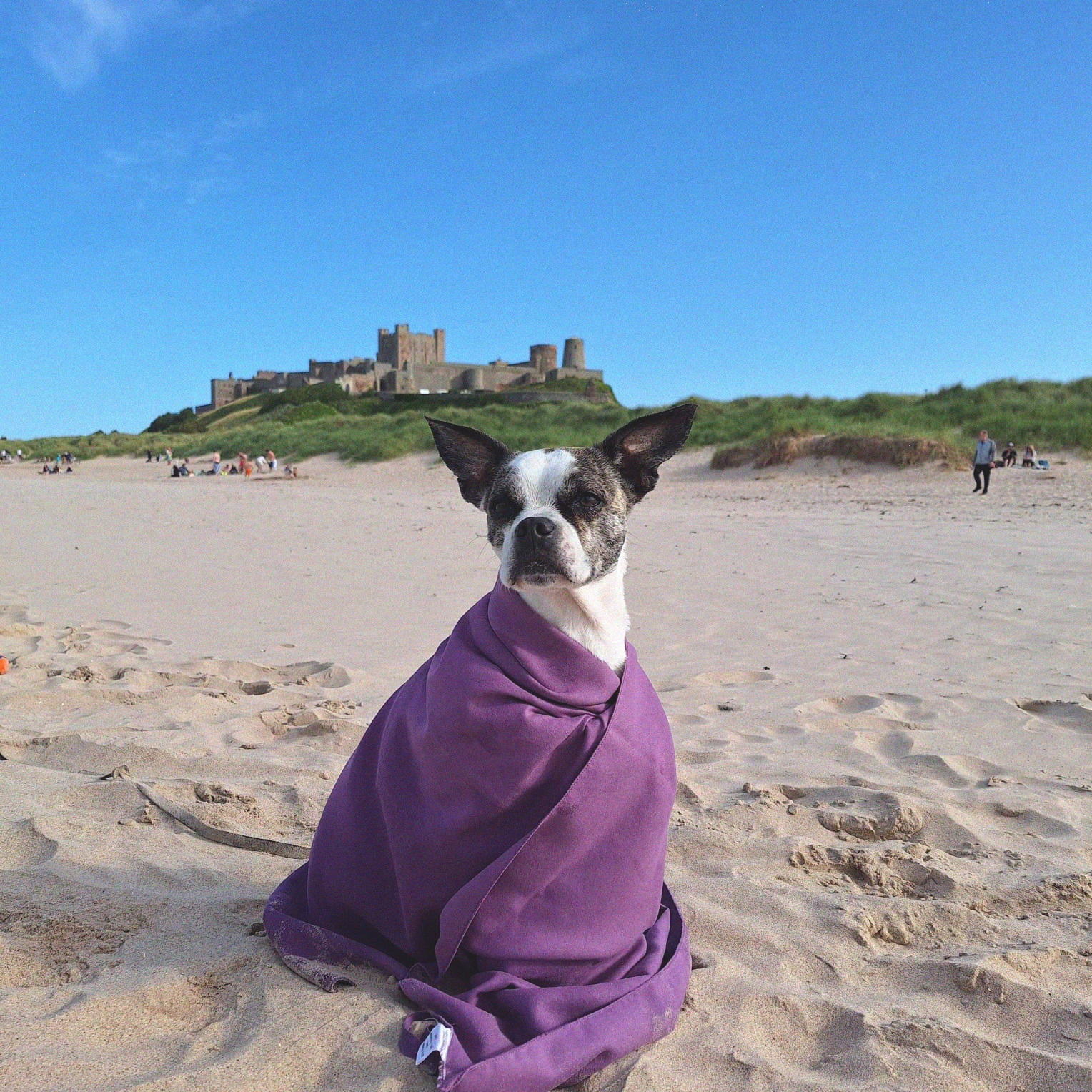
What sort of other hobbies or interests do you have outside of electronic music? Are there any books, films, shows or other things you’ve seen or been reading/watching that you might want to share? “My attention span has been whittled down to a nub by the internet. I’ve fallen into a spiral of speed-reading short-form articles and watching poorly produced youtube documentaries. I hate it actually, I think I need Audible or something as I’m just unable to focus on physical books regularly enough to appreciate them.
I’ve played basketball for the last 20 years, and it’s been essential for me in terms of the mental benefits it brings. I played at a good level but I often just play solo now – all you need is dry-ish weather, access to a hoop and a ball.
I’ve found that it has strong parallels with working on creative stuff. Things like tweaking and refining technique, measurable progress, little incremental changes making a significant difference. There’s a complex chain of micro-movements involved in a jumpshot motion – you get the best results when you’ve established a rhythm and enter into a kind of flow state, which is a lot like producing or basically any creative pursuit. You end up untangling a lot of mind clutter when you’re out doing this for an hour or two, and it’s been invaluable in keeping my mental health relatively in check over the last two decades.”
Could you describe the process of creating this mix? Was there a specific message or feeling you wanted to convey? “I chose to go all vinyl for this one. It made track selection more simple as it narrowed the scope; having access to a million different options digitally is a bit overwhelming sometimes. The great thing about mixes is that there’s no set context, you don’t have to select records for anything other than the scenario you’ve dreamt up in your head. I chose to go for some of the more deep and rolling parts of my collection for your mind to wander to, a nice little dark club filling up’ selection which is a slot I love to play. In the same spirit I wanted to keep it a bit loose and not focus too much on the transitions being super precise.”
Last, usual question from us, what was the last thing to put a big smile on your face and when was the last time you had a proper dance? “The last proper dance and early morning taxi home I had was at Tilla Tec in Amsterdam this summer on my friend Practitioner’s stag. The last time I had a big smile on my face was doing tricks with Juno in a beautiful sunny park, the morning before he took ill. RIP little fella, what a blessing it was for us to exist at the same time.”
Edmondson: Soundcloud, Instagram, Bandcamp, Resident Advisor
Lissoms: Soundcloud, Bandcamp
You can download Truancy Volume 336: Edmondson in 320 kbps and view the full tracklist on Patreon here. Your support helps cover all our costs and allows Truants to continue running as a non-profit and ad-free platform. Members will receive exclusive access to mixes and tracklists. We urge you to support the future of independent music journalism — a little goes a long way. If you need any IDs though, please leave us a comment on the Soundcloud link and us or Myles Mac will get back to you with the track :)


